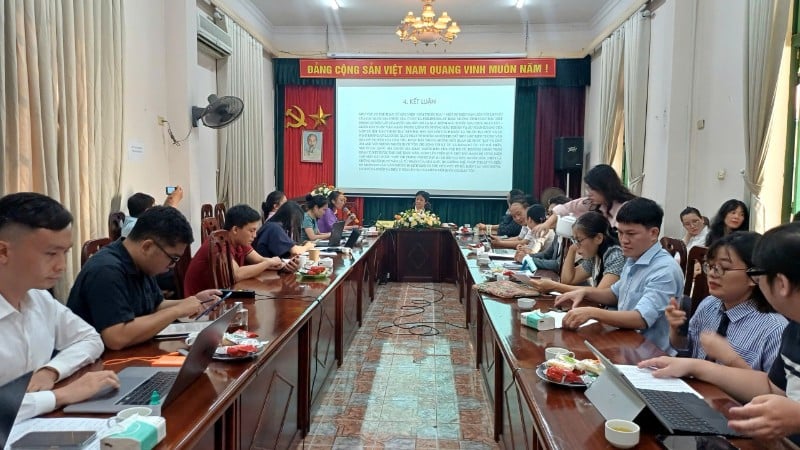
The workshop is part of the national project "Postcolonial Southeast Asian Literature and National Metaphors" (code 602.04-2023.01), chaired by Associate Professor, Dr. Pham Phuong Chi, hosted by the Institute of Literature, sponsored by the National Foundation for Science and Technology Development (NAFOSTED).
In the introductory report, Associate Professor, Dr. Pham Phuong Chi mentioned that for Vietnamese scholars, the presence of an independent literature - not dominated or dominated by external cultures and politics - in Southeast Asian countries seems to be the most painful and troubling research question.
A consistent argument in these works is the assertion that folk literature, along with indigenous culture, is affirmed to have a fundamental role, or as researcher Luu Duc Trung (1998) said, is a filter, orienting the process of receiving and interacting with cultural and literary forces coming from outside.
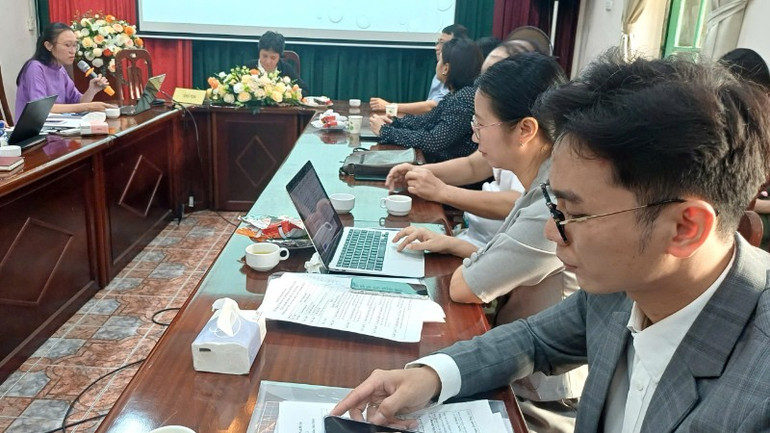
Meanwhile, ancient, medieval, and modern literature in Southeast Asian countries is often depicted in collision and even dominance over foreign forces (both Eastern and Western) thanks to the efforts of local artists in absorbing new things, applying traditions to create a unique writing style and themes of their national literature.
Such a trend of studying Southeast Asian literature reflects the responsibility of Vietnamese scientists towards their national literature, and that is also the responsibility towards national culture.
"The workshop approaches Southeast Asian literature as literary expressions and images capable of engaging with issues of modernization, class division, racial conflict, religious conflict, gender stereotypes, and environmental and ecological criticism in Southeast Asian countries during the process of post-colonial nation building," Associate Professor, Dr. Pham Phuong Chi shared.
According to her, with this approach, the conference hopes to contribute to making Southeast Asian literature - a literature that is still considered marginal - appear more clearly on the world literary map.
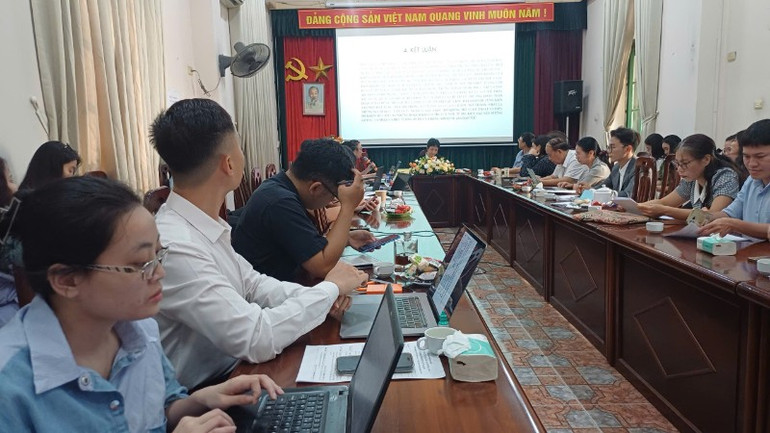
In addition, the workshop can lead readers beyond the notion of "nation" as a purely political or purely emotional category to arouse intellectual curiosity about why we can feel more attached and familiar with people who happen to live in the same country than with people who live elsewhere; why we can feel more in tune with the ideology of people born in the same country than with people born elsewhere; why there are people who are willing to sacrifice themselves for people belonging to the same nation even though they have never met.
The conference promises to bring to light aspects and moments of the Southeast Asian literary landscape, which is diverse and constantly being made meaningful by different approaches. The case studies in the conference may confirm or dialogue with the literary and ethnic theories proposed by Western theorists and critics.
This is a large-scale, interdisciplinary and regional scientific conference, bringing together new approaches in Southeast Asian literary research, especially in the interaction between literature, identity, politics and the process of nation building.
The scientific conference was divided into two sessions. The first session, chaired by Dr. Hoang To Mai, featured research works exploring the issues of migration, urbanization and decolonization from a literary perspective.
The presentation by Do Thi Huong (Institute of Literature), with the case of the novel "The Woman with Two Navels" by writer Nick Joaquin (Philippines), shows how the female character becomes a transnational symbol, reflecting conflicts in identity and the power of historical memory.
The workshop also highlighted a very interesting issue: the city as a symbolic structure in modern Southeast Asian literature. Studies by Han Thi Thu Hien and Le Thi Nga (Hung Vuong University) on contemporary Lao short stories, and by Dang Le Tuyet Trinh on the works of Alfian Sa'at (Singapore) and Nguyen Thi Thu Hue (Vietnam), showed that the urban image is no longer a static backdrop but has become a semantic tool for literature to question gender norms, marriage regimes and the shifting of individual identities in post-colonial societies.
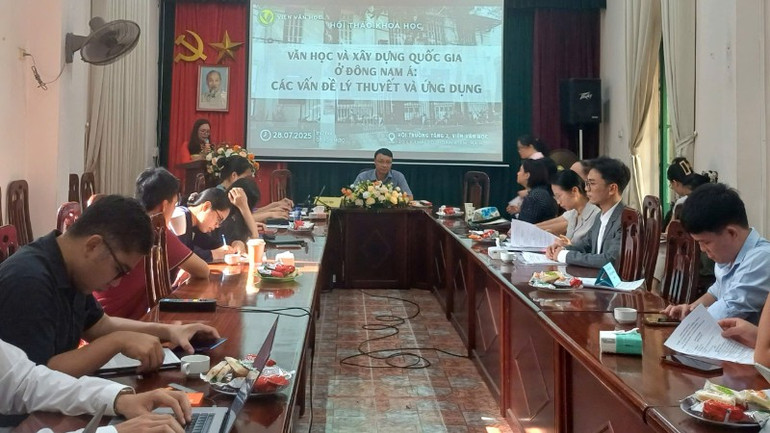
Another interesting point comes from Do Hai Ninh (Institute of Literature) when raising the issue of "national consciousness in Vietnamese literature 50 years after unification". The study shows profound changes in national discourse, from collective heroic images to more private, fragmented and reflective voices, especially in post-war and contemporary literature.
The second session, chaired by Dr. Do Hai Ninh, expanded the research scope to nationalist theory, historical tradition and pre-modern literature. Tran Duc Dung's presentation (Hanoi Pedagogical University) discussed the "method of legitimation" in Ly-Tran literature, showing that medieval literature was not simply a propaganda tool but also a channel for creating ethical standards, order and cultural power. Literary critic Doan Anh Duong raised the issue of Nguyen Van Vinh in the early 20th century with many efforts to modernize language and publishing.
In the field of modern-modern literary studies, Luu Ngoc An's discussion of Nam Phong magazine, and how this magazine received E. Renan or A. Fouillée, points out the complex relationship between translation, rewriting and national construction with the process of ideological transformation.
Choosing an approach to memory and national symbols in modern literature. Nguyen Thi Hong Hanh exploits the image of the buffalo as a national metaphor in Le Quang Trang's short story, while Le Thi Huong Thuy raises the issue of women's hair - seemingly purely aesthetic but containing layers of identity and gender in Vietnamese culture.
Some papers are deeply intercultural and interdisciplinary, such as those by Nguyen Phuong Anh-Pham Phuong Chi (comparison of Ayu Utami-Nguyen Khac Ngan Vi), or Mai Thi Thu Huyen-Le Thi Duong, focusing on the emotional community in Vietnamese resistance poetry. They show that tears are a symbol of a collective suffering, resilience and commemoration - an indispensable element in the journey of building national identity through literature.
In addition, studies on Cambodian literature, Lao literature and Japanese literature from a comparative perspective (Tang Van Thon, Khuong Viet Ha...) also contribute to expanding the theoretical map of Southeast Asian literature, emphasizing intra-bloc connections and the importance of interdisciplinary studies in modern studies.
The workshop contributed to highlighting the role of literature in building a nation in terms of memory, emotion and symbolism. Although Southeast Asian countries have different historical, linguistic and geopolitical characteristics, they all share a complex post-colonial reality, requiring literature to constantly redefine itself in collision with reality.
The event opened up a space for vibrant academic exchange, contributing to affirming one thing: Literature is not outside of history, but is the way we rewrite history with passion, thinking and deep emotions.
Source: https://nhandan.vn/hoi-thao-ve-van-hoc-va-xay-dung-quoc-gia-o-dong-nam-a-post896943.html



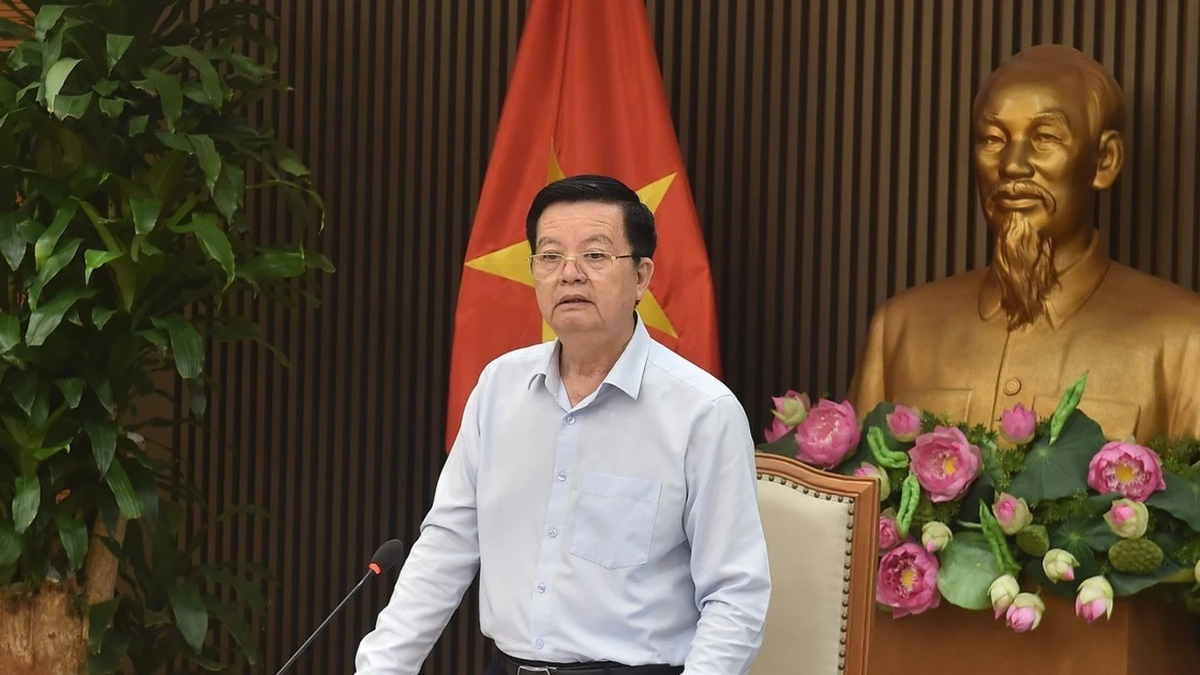

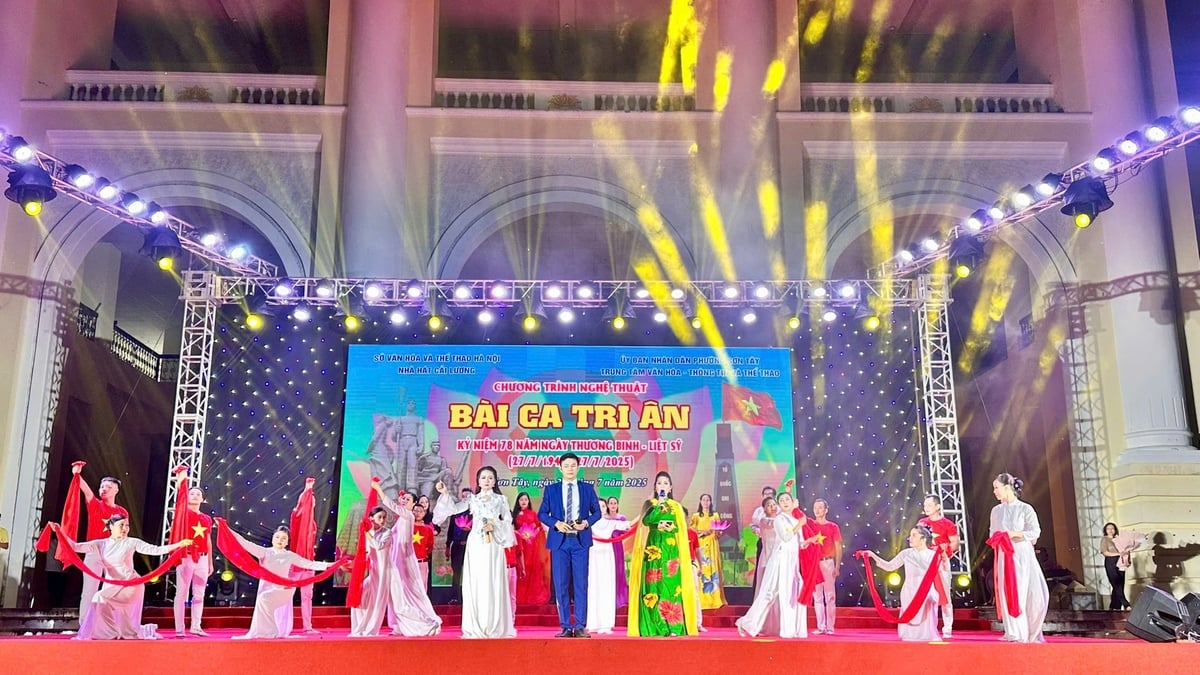


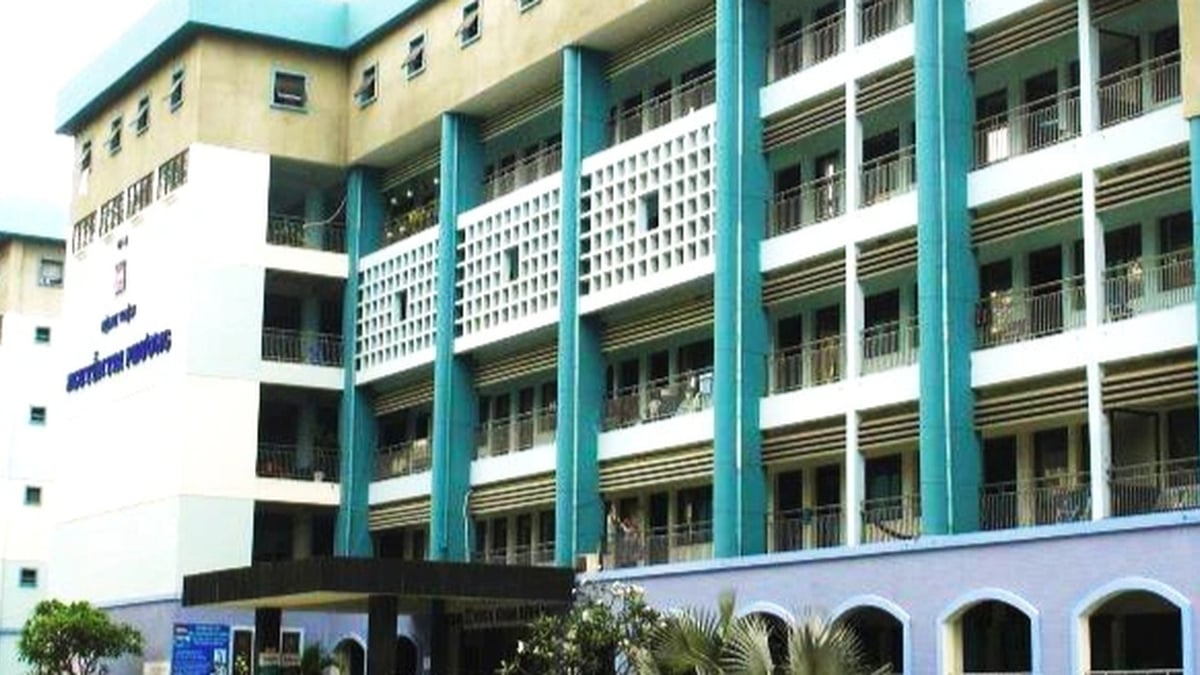
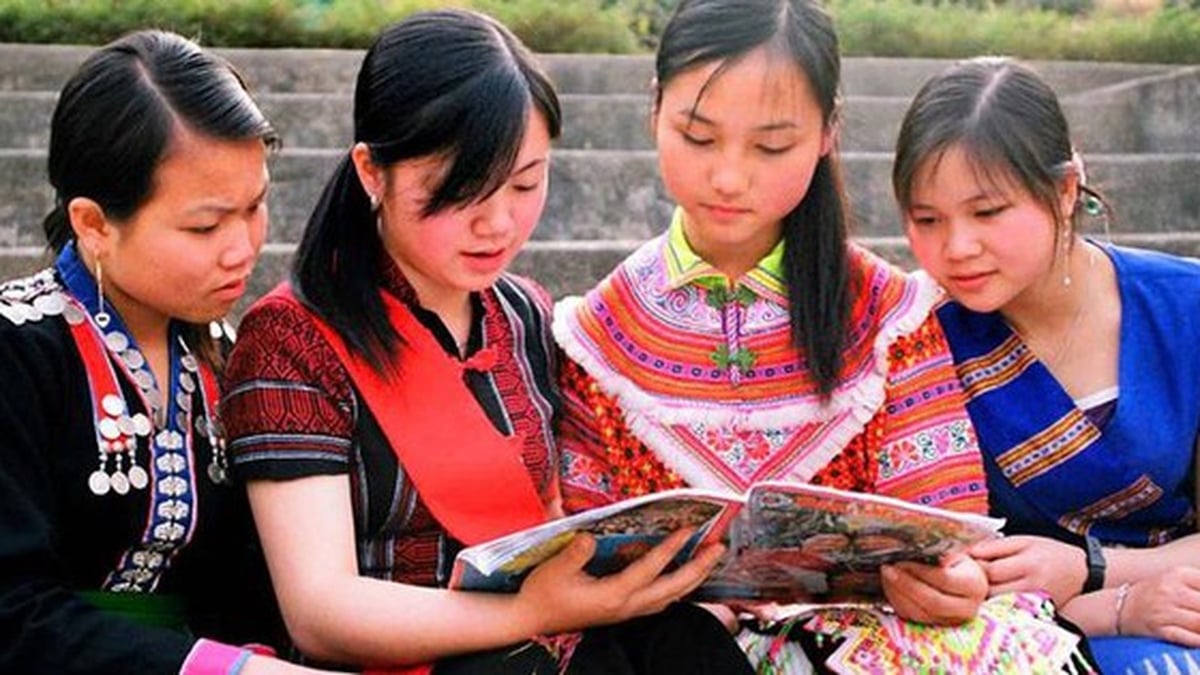













![[Photo] National Assembly Chairman attends the seminar "Building and operating an international financial center and recommendations for Vietnam"](https://vphoto.vietnam.vn/thumb/1200x675/vietnam/resource/IMAGE/2025/7/28/76393436936e457db31ec84433289f72)










































































Comment (0)